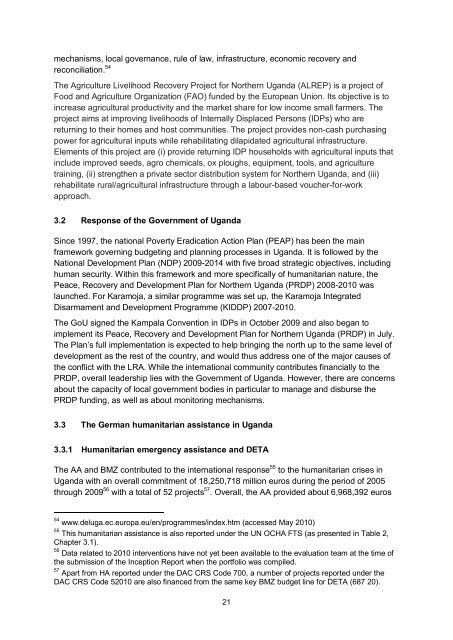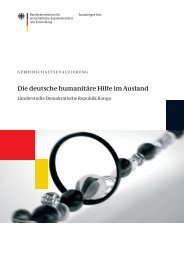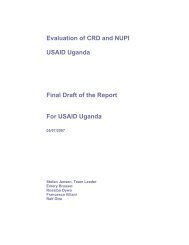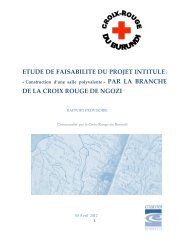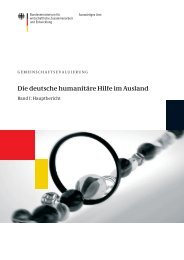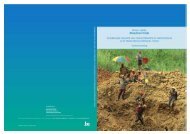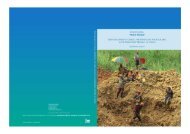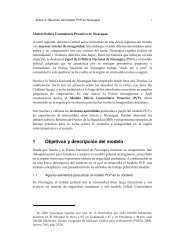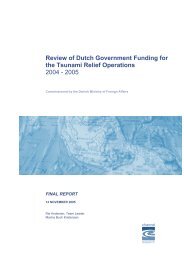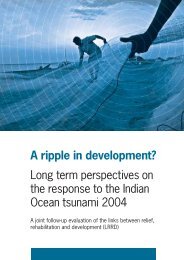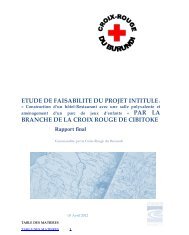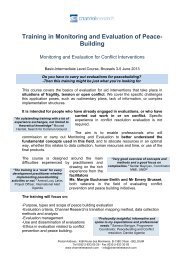German Humanitarian Aid Abroad - Channel Research
German Humanitarian Aid Abroad - Channel Research
German Humanitarian Aid Abroad - Channel Research
You also want an ePaper? Increase the reach of your titles
YUMPU automatically turns print PDFs into web optimized ePapers that Google loves.
mechanisms, local governance, rule of law, infrastructure, economic recovery and<br />
54<br />
reconciliation.<br />
The Agriculture Livelihood Recovery Project for Northern Uganda (ALREP) is a project of<br />
Food and Agriculture Organization (FAO) funded by the European Union. Its objective is to<br />
increase agricultural productivity and the market share for low income small farmers. The<br />
project aims at improving livelihoods of Internally Displaced Persons (IDPs) who are<br />
returning to their homes and host communities. The project provides non-cash purchasing<br />
power for agricultural inputs while rehabilitating dilapidated agricultural infrastructure.<br />
Elements of this project are (i) provide returning IDP households with agricultural inputs that<br />
include improved seeds, agro chemicals, ox ploughs, equipment, tools, and agriculture<br />
training, (ii) strengthen a private sector distribution system for Northern Uganda, and (iii)<br />
rehabilitate rural/agricultural infrastructure through a labour-based voucher-for-work<br />
approach.<br />
3.2 Response of the Government of Uganda<br />
Since 1997, the national Poverty Eradication Action Plan (PEAP) has been the main<br />
framework governing budgeting and planning processes in Uganda. It is followed by the<br />
National Development Plan (NDP) 2009-2014 with five broad strategic objectives, including<br />
human security. Within this framework and more specifically of humanitarian nature, the<br />
Peace, Recovery and Development Plan for Northern Uganda (PRDP) 2008-2010 was<br />
launched. For Karamoja, a similar programme was set up, the Karamoja Integrated<br />
Disarmament and Development Programme (KIDDP) 2007-2010.<br />
The GoU signed the Kampala Convention in IDPs in October 2009 and also began to<br />
implement its Peace, Recovery and Development Plan for Northern Uganda (PRDP) in July.<br />
The Plan’s full implementation is expected to help bringing the north up to the same level of<br />
development as the rest of the country, and would thus address one of the major causes of<br />
the conflict with the LRA. While the international community contributes financially to the<br />
PRDP, overall leadership lies with the Government of Uganda. However, there are concerns<br />
about the capacity of local government bodies in particular to manage and disburse the<br />
PRDP funding, as well as about monitoring mechanisms.<br />
3.3 The <strong>German</strong> humanitarian assistance in Uganda<br />
3.3.1 <strong>Humanitarian</strong> emergency assistance and DETA<br />
The AA and BMZ contributed to the international response 55 to the humanitarian crises in<br />
Uganda with an overall commitment of 18,250,718 million euros during the period of 2005<br />
through 2009 56 with a total of 52 projects 57 . Overall, the AA provided about 6,968,392 euros<br />
54 www.deluga.ec.europa.eu/en/programmes/index.htm (accessed May 2010)<br />
55 This humanitarian assistance is also reported under the UN OCHA FTS (as presented in Table 2,<br />
Chapter 3.1).<br />
56 Data related to 2010 interventions have not yet been available to the evaluation team at the time of<br />
the submission of the Inception Report when the portfolio was compiled.<br />
57 Apart from HA reported under the DAC CRS Code 700, a number of projects reported under the<br />
DAC CRS Code 52010 are also financed from the same key BMZ budget line for DETA (687 20).<br />
21


